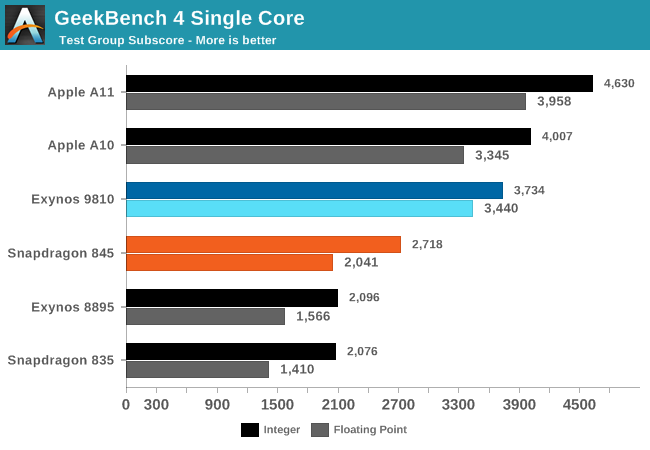Yeah, it certainly seems so. I didn't realize the difference between the Exynos and SD for the S7, and I don't think the benchmarks were out when I got my S7 a week before its official release date to compare the two. I know for the S7, the Exynos had the ridiculous battery life and we SD guys were a good 2+ hours less of SOT vs the comparable model (Flat vs Edge).
Also, speaking of benchmarks,
http://appleinsider.com/articles/18/02/27/early-benchmarks-shows-samsung-galaxy-s9-well-behind-iphone-x-in-processor-performance
I always see the argument switch back and forth between whether benchmarks mean anything or not. But we already know Apple's chips are pretty much the ones to beat when it comes to these benchmarks between the two OSs. And the X is 4, or so, months old.
Iphones have gigantic, high power CPU cores that favor burst performance, but throttle fast. Qualcomm's cores are more balanced and righfully favor sustained performance, while Samsung did something in between, but much closer to the Apple cores than Qualcomm's.
Regarding the article, gotta love fresh, north korea style propaganda. I'd get brain cancer if I read the whole thing.
The single core performance in terms of pure hardware is quite close while the Samsung cores are using up almost 40% less power, so the Samsung cores are technically better for mobile phones than Apple's. Even Anandtech, while pro-Apple, gave props to Samsung for having a more balanced mobile CPU that is ridiculously fast for the power that it uses. Sure, Apple's is a little faster, but Samsung is right behind and at lower power, and miles ahead of any other chip on Android camp.
Web benchmarks, as Anandtech put it, indicate that something's wrong with how the phone deals with load demand, hopefully only on the demo units. First of all Samsung's CPU governor (probably not being tweaked yet) moves the load to the small cores. That means that the Exynos cores wouldn't even be tested by the web bench, as the phone decides that the task doesn't require being processed by the large cores, and most of the work for web tasks was done by the power-saving cores. CPU governor is just a set of settings that can be tweaked and changed on the fly, so there's hoping Samsung does that properly for the retail units.
That said, I can also see why Samsung would like the current setting, as Google's web engine is very inefficient and require a lot of power to process simple websites, the power that Samsung would rather save using the power saving cores to ensure longer battery life when browsing the web, as opposed to having some websites drain the battery fast, especially as the power saving cores are much faster this generation and can handle that "well enough". Which leads me to the second point.
The second point is that Apple's javascript engine (software) is simply much better than Google's shitty Chrome one. While the governor can drastically change for the retail units, there is a reason why all Android phones score lower than iPhones in web tests and it has nothing to do with hardware - iOS handles websites much more efficiently than Android, which is purely due to Google being really behind at optimizing web performance, which is unbelievable considering that Google is a web company. That will get fixed with software, as soon as Google actually optimizes its engines. By now pretty much any major browser is also faster than Chrome, so I suspect this has to happen soon. Until then, you can use an Intel i7 to browse the web on Android and it could still trail iOS in terms of some web benchmarks, mainly Javascript performance, mostly due to Google's weak and inefficient javascript performance. If Android 9 or 10 comes out with a superior javascript engine, all Android phones getting such update will benefit retroactively and severely improve in web benchmarks. That goes much further than just browsing the web, as many simple apps (such as news apps, even some games) are made based on webview, which renders them using Google's inefficient web engine, rather than natively. The fact that Google is so far behind in that regard is really surprising.


 I would really feel horribly buttfucked if I got the Snapdragon version. It's literally like a defective product in comparison.
I would really feel horribly buttfucked if I got the Snapdragon version. It's literally like a defective product in comparison.